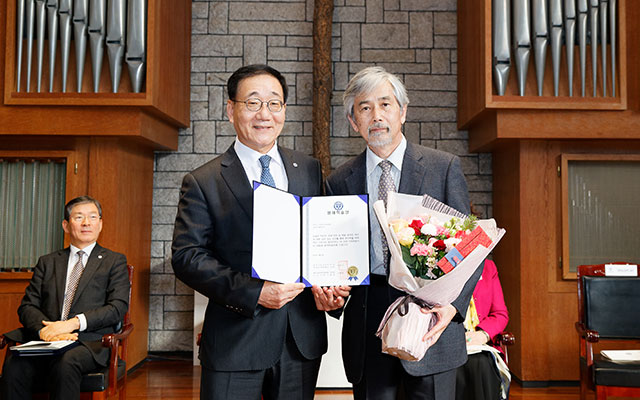- Yonsei Korean Studies Award to Japanese Scholar Naoki Mizuno of Kyoto University April 22, 2019
-
Naoki Mizuno receives 2019 Yongjae Academic Award
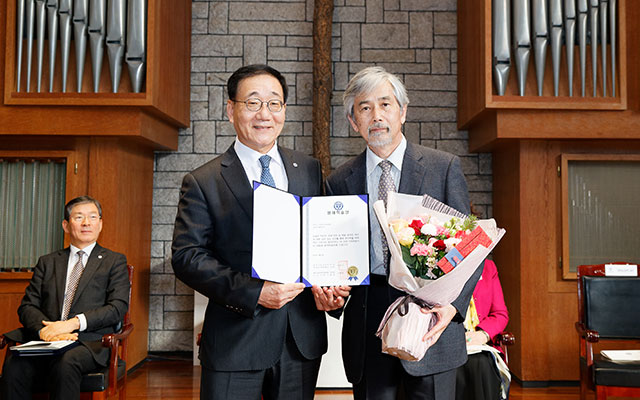 (from left) Yonsei President Kim Yong-Hak, Kyoto University emeritus professor
(from left) Yonsei President Kim Yong-Hak, Kyoto University emeritus professor
Naoki MizunoYonsei University presented the 2019 Yongjae Academic Award to Dr. Naoki Mizuno, a researcher of modern Korean history and emeritus professor of Kyoto University, in honor of his outstanding contributions to the advancement of Korean studies. It is the first time that a Japanese scholar has won the award.
The Yongjae Award was established to recognize prominent Korean Studies scholars around the world through the Yongjae Academic Award and the Yongjae Chair Professorship. It was first created in 1995 to commemorate Yongjae Paek Nak Jun (1895-1985) - the first President of Yonsei University - on the 100th anniversary of his birth.
The Yongjae Award, which marks its 25th anniversary this year, honors Yongjae Paek Nak Jun's academic achievements and to continue his legacy of advancing education and research in Korean studies based on the spirit of Christian values.
After completing his studies at Princeton University and Yale University, Yongjae Paek Nak Jun returned to Korea in 1927. He was appointed a professor of Yonhi College, the predecessor of Yonsei University, and served as the Minister of Education during the Korean War. Subsequently, Paek Nak-jun became the first president of Yonsei University, following the historic merger of Chosun Christian College and Severance Medical School in 1957. During his years at Yonsei, he established the Institute of East Asian Studies as the first research institute at Yonsei University and predecessor to the current Institute of Korean Studies.
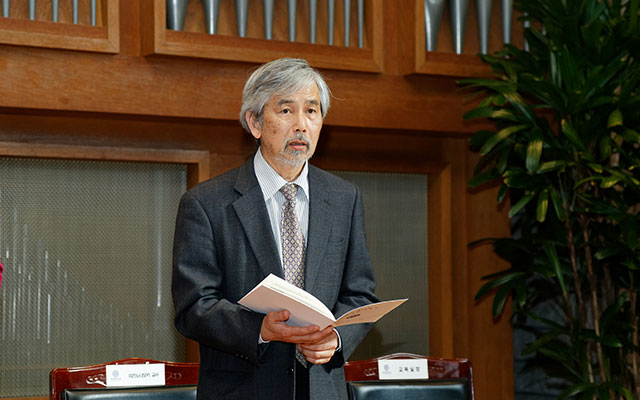 Kyoto University emeritus professor Naoki Mizuno
Kyoto University emeritus professor Naoki Mizuno The recipient of this year’s Yongjae Academic Award is Dr. Naoki Mizuno, emeritus professor of Kyoto University. A renowned scholar of East Asian imperialism and colonialism, Dr. Mizuno has worked to shed light on the history of Japanese colonial rule of Korea and resolve the issues of ethnic Korean residents in Japan. Dr. Mizuno began his research on the Korean national movement under Japanese colonial rule and led a historical study on the Korean community in Japan. He contributed greatly to the revitalization of research on Korean history in Japan through the activities of the Joseon History Research Association in Japan.
A pioneer in the social research of ethnic Koreans in Japan, Dr. Mizuno led the study of their formation and transformation from the early twentieth century to the present. He conducted a systematic study on the reality and nature of Japan's colonial rule policy and published extensively in Japan and Korea. His work has promoted academic research in both countries and contributed to the assimilation of Korean studies in other regions as well. Dr. Mizuno holds bachelor, master’s and bachelor degrees in history at Kyoto University and has served as Director of the University’s Institute for Research in Humanities. He had also collaborated with Yonsei University as visiting professor at Yonsei’s Institute of Korean Studies.
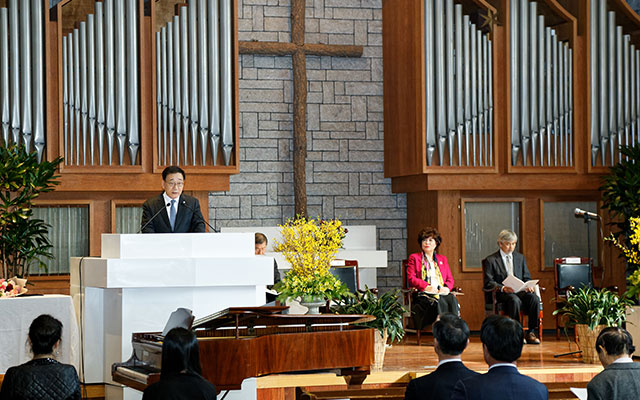
The 25th Yongjae Award ceremony for Dr. Naoki Mizuno was held at Luce Chapel at Yonsei University in Seoul, Korea on March 8, 2019. Distinguished guests and Yonsei senior leadership, including President Kim Yong-hak, Provost Hong Jong-hwa and Director of Yonsei’s Institute of Korean Studies Shin Hyung-ki attended the ceremony to celebrate his achievements.
"I believe this award commemorates Korean studies scholars in Korea and Japan dedicated to promoting academic exchange, and this achievement encourages me to continue to pursue my research," said Dr. Mizuno during his acceptance speech. “I will continue to give my best efforts to deepen mutual understanding between the two countries through active research collaboration."
Following the ceremony, Dr. Mizuno shared his personal story and views on his research in a one-on-one interview with the Yonsei student newspaper, The Yonsei Chunchu.
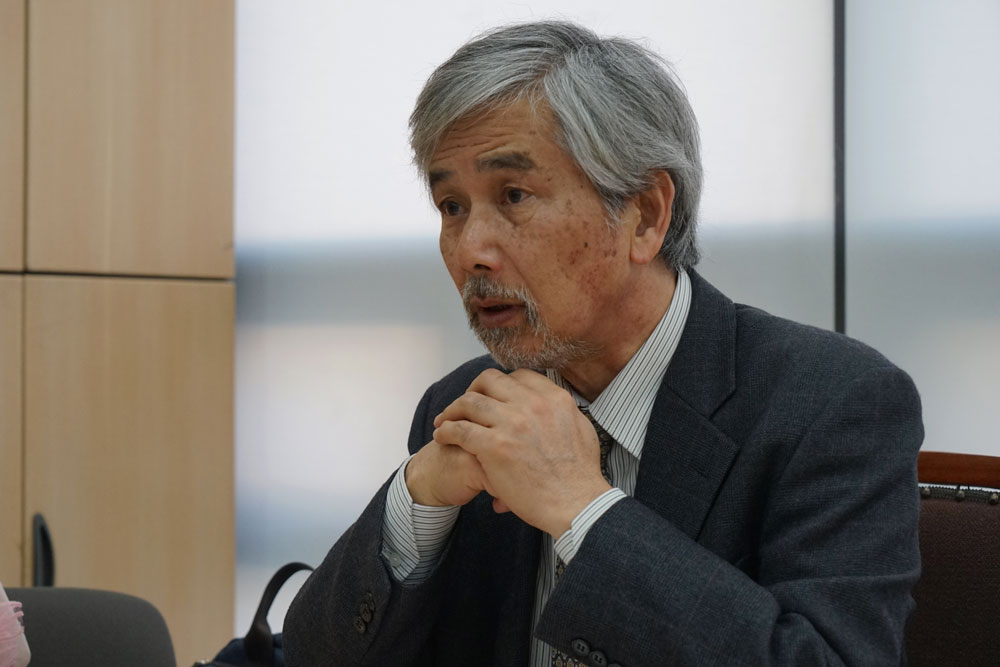 Dr. Naoki Mizuno during The Yonsei Chunchu interview
Dr. Naoki Mizuno during The Yonsei Chunchu interview
(Photo credit: The Yonsei Chunchu)Excerpts from The Yonsei Chunchu interview
What motivated you to begin studying Korean history?
During my elementary school years, I met Koreans living in Japan and realized that they were not treated fairly - for example, they could not become civil servants in Japan, and the area where they resided was often outdated. I felt the injustice of this social discrimination and became interested in Korea as a country as well as ethnic Korean residents in Japan.
In 1971 at the request of a friend, I participated in protests to support the Suh brothers (Suh Sung and Suh Joon-sik), two ethnic Koreans from Japan who were imprisoned on allegations of espionage, thus violating the National Security Act. I initially only helped out with the rallies, but I became more committed and then continued activist work for 20 years. As I participated in protests and experienced Korea and Japan’s democratic movements, I decided I should become more educated in the history, culture, and language of Korea. So I began studying.
How is research on Korea currently being conducted in Japan and where is its future headed?
Few scholars studied Korean history when it was first introduced in the 1970s, but many people became more interested in Korea since the Korean Wave (Hallyu) phenomenon in the 1990s. Many researchers are interested in the comprehensive areas of Korean studies, such as Korean culture and society as well as its history. It is difficult to tell in a word which direction research Korean studies is heading - it is very diverse.
You are endeavoring to promote Korea-Japan relations. What do you think are necessary measures?
From the viewpoint of a researcher, it is necessary for Korean and Japanese researchers to conduct joint research. If the general public becomes interested in the history of both countries, Korea-Japan relations will be restored.
Any final words for Yonsei students?
There are many political issues involved in Korea-Japan relations. I am aware that many students at Yonsei University appreciate Japanese culture. I would like to stress that politics and culture are intertwined issues. I hope when you enjoy Japanese culture that you will consider the political aspects and vice versa.
show mobile menu
mobile menu

